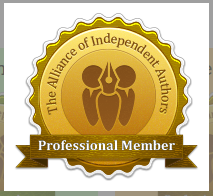Well-crafted characters - why they're essential to a novel Today I'd like to look at what traits readers love in a character. As well as what they hate! My reason? I've just finished reading a book that's garnered high praise from literary pundits, but which failed to impress me. The main reason was the characters - totally flat and unbelievable, very one-dimensional. The protagonist was cold, unfeeling, dismissive of her parents because they lacked money. Yet the author wanted me to believe this person was also capable of a great, undying love. By that time I'd given up caring about her, repelled by her personality. The other characters were no better. To make matters worse, the plot lacked depth and cohesion, along with an unsatisfactory ending. Crafting great characters is one of the hardest challenges authors face. The storyline might be intriguing, the narrative well written, yet if readers don't identify with the main characters, then the book is unlikely to entertain them. Or even hold their interest past the first few chapters. So what makes a great character? 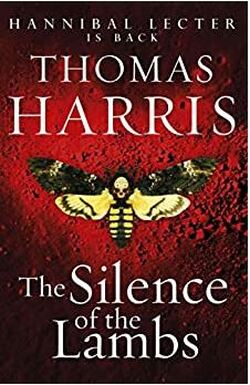 Hannibal Lecter, from Thomas Harris's novel The Silence of the Lambs, springs to mind. This is no cardboard cut-out antagonist, but a complex individual who captures the reader's imagination, partly because he presents two such different sides to his personality. On the one hand, he is cultured, well educated, a former Baltimore forensic psychiatrist. He is knowledgeable about art, literature and cuisine. Yet he is also a psychopathic and cannibalistic serial killer. Quite a juxtaposition, isn't it? And that's what makes Lecter such a compelling personality. He'd make a great dinner guest – provided he didn't eat you! What follows are my thoughts on what makes a great character. First, they need to arouse empathy in a reader. I don't necessarily have to like them, but I do need to be on their side, eager for them to overcome their demons by the end of the story. They should also be interesting. I don't want to read about someone who works in a mundane job, has no friends and holds no opinions. That's boring, and in real life we shy away from dull individuals. Instead, I like characters to have fire in their bellies, to laugh, to cry, to experience pain and joy and all the emotions that come attached to this crazy life we're living. Treat 'em mean... 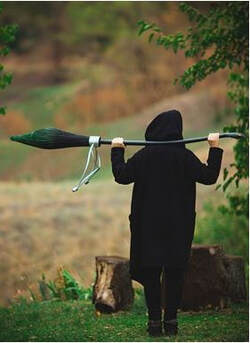 One piece of advice that's often dished out to writers is to torture their characters... and then torture them some more. Wise words, in my opinion! By forcing them to endure angst, loss, loneliness, an author makes them real, because sorrow and tragedy happen to us all. In addition, how a character faces life's trials helps to shape their personalities, meaning that by the end of their novel, they've changed - and for the better. An example is Luke Skywalker from the Star Wars franchise, who morphs from a humble farm boy to a great Jedi warrior. I love it when a character aspires to become a better person, often as a result of pain they've suffered in the past. Sometimes they're the underdog in a novel, a plot device that helps the reader to root for them. Underdogs are called to rise to challenges that will shape their personalities; a notable example is Harry Potter from J K Rowlings' books. Once a mistreated boy forced to live in a cupboard under the stairs, he eventually becomes an accomplished wizard despite facing adversaries such as Draco Malfoy and Lord Voldemort. Speaking of which, antagonists in a novel need to be worthy of the title of villain. Make them dark, make them twisted, make the reader loathe them, yet be fascinated by them. Hannibal Lecter again! To be well-rounded, a characters needs to have flaws, because who doesn't? I don't want to read about someone who's always calm, patient, reliable, consistent - such people don't exist. We're all imperfect, changeable, difficult at times - some of us all the time! This leads me on the my last point - characters need to be believable. Don't give me street thugs who never swear, teenagers who don't act out, couples who never argue. I want reality, in all its ugly glory, because that's what shapes an great read. And I suspect other readers do too. What do you think? Are there any points you can add? What do you like or loathe in a character? Leave a comment and let me know!
1 Comment
Combining writing with travel - is it possible?  Patagonia, visited towards the end of my trip Patagonia, visited towards the end of my trip Those who know me well are familiar with my wanderlust! I've been passionate about solo travel for decades now and I've been fortunate to have explored many wonderful countries. For a long time it's been my ambition to combine travel with writing and become, at least for a while, a nomadic novelist. All I need to work is a computer and a decent internet connection, so the idea seemed very achievable. In addition, there were several trips I longed to get under my belt, and most of them were west of the UK, in the Americas. Combined with the nagging feeling I was in somewhat of a rut in Bristol, it wasn't a hard decision to arrange another overseas jaunt. This time I liked the notion of travelling without a set return date. I bought a one-way ticket to Canada to enable me to fly to Toronto in April 2017, with some vague plans as to where to visit after French Canada, which I'd missed on my last trip to the country back in 1990. I ending up spending a couple of months in Canada before I crossed the border into the USA, where I had friends with whom I wanted to reconnect. In America I visited Vermont, then Boston, Philadelphia and Washington, before making my way to Las Vegas, where I hired a car and went touring for a week. My journey included the wonders of Monument Valley, Zion National Park and other beautiful places before I finished up in San Diego. Next came Mexico, El Salvador, Costa Rica, Panama. Colombia, Peru, Ecuador, Bolivia, Chile and Argentina. Towards the end of my trip I seized the chance to travel to the Falklands, South Georgia and the incredible White Continent, Antarctica. WOW!!! What a fantastic experience. The wildlife on South Georgia was awe inspiring - beaches packed full of seals and penguins, accompanied by some very strong fishy odours! As for Antarctica, a friend told me it's like being in a different world, and she was right. The silence, the ice, the remote location… I'd love to return some day and explore further. So how hard was it to travel and write at the same time?  Intriguing Quito, in Ecuador Intriguing Quito, in Ecuador My main fear before I set off was whether I'd be able to combine travelling and writing. My previous trips had usually been done at a fast pace, with lots of planes, trains and buses involved - hardly conducive to the quiet writing environment I prefer! I found it hard to write the first draft of 'His Kidnapper's Shoes' while travelling in 2010-11, and I only completed the book by parking my butt in the gorgeous Bolivian city of Sucre and not leaving until I'd finished. Hence my concern. How would I manage all the sight-seeing I'd want to do while writing my novels? As well as maintaining the rest of my business - marketing, finance, etc? It turns out I needn't have worried. I managed to maintain a full work schedule and still got to visit the sights I want to see. Most times I would work during the morning and get out and about during the afternoon and evenings. I also tried to arrange travel and sight-seeing whenever possible at the weekends. It all worked out really well and my schedule left me plenty of time left to practise yoga, read and socialise. What helped was not having a set itinerary; there was nowhere I needed to be at any particular time. From what I understand, this way of working is becoming more common, with more and more people choosing to become digital nomads. and why not? If your work is internet-based, such as web design or life coaching, then you can earn money wherever you are in the world. You're not location-dependent for your income. It's immensely freeing and if, like me, you love travelling, it's the ideal solution. As I mentioned earlier, I'd become aware I was deep in a rut in Bristol, and needed to break out. It felt right to be backpacking again, with everything I needed in a couple of bags, moving from one wonderful place to another, doing as I pleased. Since my return from that trip, which lasted ten months, I've moved to Newcastle-upon-Tyne and been busy with other things, but I plan to continue combining travel and writing in the future. Who knows, maybe I'll inspire some of my readers to become digital nomads! See you in Rio, perhaps! People who see music and taste words...  In October 2016 I discovered I have synaesthesia, which came as a surprise! It seems that many people, myself included, don't realise that they view the world differently. What is synaesthesia, you may be wondering? It’s when the senses cross over, meaning one type of stimulation evokes the sensation of another. For example, hearing a sound may result in a synaesthete seeing that sound in colour; musicians such as Billy Joel and Mary J. Blige visualise music this way. Synaethesthia can combine any of the senses, although the most common types are the ones I have, when letters, numbers and time assume colours and shapes. I find some of the rarer forms, such as lexical-gustatory synaesthesia, in which people taste words, fascinating! As a foodie, I’m quite envious of that one, but studies show only 0.2% of people have lexical-gustatory synaesthesia. To help non-synaesthetes understand, to some extent we all do this anyway. Have you ever talked about warm colours or complained that the weather is bitterly cold? Then you’ll have some idea of what I mean. Think about smell and taste; those senses are linked for almost everyone, meaning we can predict how a food will taste from sniffing it. Synaesthesia takes this process a step further. It’s a shame some of the articles I read referred to it as an affliction or medical condition. To me, that smacks of the prejudice that existed decades ago against left-handed people, and isn’t helpful. August is such an orange month... There are two main forms of synaesthesia – projective and associative. People with the former type actually see the shapes and colours projected into their vision, whereas others, like me, have the associative type – we see the results in our mind’s eye, not in reality. Statistics vary as to how many people are synaesthetes – the most common one indicates that 4.4% of people have it. Some researchers have postulated that everyone is born with synaesthesia, with most people losing the ability early in childhood. Early research linked synaethesia to being left-handed and poor with mathematics, although later studies contradict such findings. As a right-handed ex-accountant, that's definitely not true for me! I came across the condition a while ago, thought "yeah, I have that - doesn't everyone see letters in colour?" and then didn't think any more about it. After all, we don’t tend to ask people what colour their alphabet is, or how they visualise time; I honestly thought everyone must use some sort of mental map to process numbers and years. It was only when I read something about Vladimir Nabokov, who was a synaesthete, that I chanced on a Wikipedia article on the subject. After reading through it, it was obvious to me that I had synaesthesia and that it took several forms, which apparently is common. I took the long and very detailed online test at http://www.synesthete.org/ and the results confirmed my suspicions. Tasting of Flora and the country green... Kandinsky may have been a synaesthete! It appears that synaesthesia may be more prevalent in women than men, and is seven times more likely to occur in artists, musicians and writers. Besides Nabokov, other authors with synaesthesia include Joanne Harris and Orhan Pamuk. In literature, synaesthesia refers to a technique adopted by writers to present fiction so it appeals to more than one sense at a time. Take this quote from Keats’s Ode to a Nightingale: 'Tasting of Flora and the country green, Dance, and Provencal song, and sun burnt mirth!' In this example, music, dance, etc, are described as having taste – very synaesthetic! What about this quote from Julia Glass’s novel 'The Whole World Over'? 'The word would fill her mind for a few minutes with a single color: not an unpleasant sensation but still an intrusion… Patriarch: Brown, she thought, a temple of a word, a shiny red brown, like the surface of a chestnut.' I have to disagree – ‘patriarch’ is definitely lemon-coloured! No two synaesthetes view things in quite the same way, it seems. For me, words take on the colour of their first letter, unless we're talking about weekdays or months, and 'P' is pale yellow. I’m considering ways to use my synaesthesia in my writing, both through my narrative description and as the basis for a novel or series of novels. Now that I’ve discovered I’m a synaesthete, I’m keen to put it to practical use! What about you? Are any of you synaesthetes and if so, what types do you have? Leave a comment and let me know!
 A tragic case made the news a few years ago with the revelation that a young American woman, Kamiyah Mobley, had discovered she'd been abducted as a baby. It seems she'd harboured an inkling for a while that she may have been kidnapped. DNA tests subsequently proved that she was the baby abducted from a Florida hospital in July 1998 by a woman posing as a nurse. Gloria Williams, who is now in custody, brought her up as her own daughter, unbeknown to the man who believed himself to be the child's father. The case caught my eye because it mirrors some of the events in my novel 'His Kidnapper's Shoes'. While Daniel is abducted as a young child, not a baby, and from his home rather than a hospital, other facts are similar. Laura Bateman brings him up as her own child, and the truth only emerges after Daniel reaches adulthood. Like Kamiyah, he has nursed suspicions that Laura may not be his biological mother, although his doubts stem from early childhood. The original idea for 'His Kidnapper's Shoes' came from a conversation I had in 2010 concerning missing children. I put forward the opinion that most children who are kidnapped are taken by opportunistic predators. Someone else disagreed, saying that perhaps some are stolen by people unable to have children of their own. That makes sense when a baby is concerned, of course; it's believed Williams suffered a miscarriage a week before she kidnapped Kamiyah. A tragic set of events for all concerned. Anyway, the conversation got me thinking. How would it feel to discover as an adult that you'd been kidnapped as a child? That the woman who you considered your mother was actually your abductor? From that seed the idea for 'His Kidnapper's Shoes' was born. Here's a taster: On some deep level inside, Laura Bateman knows something is wrong. That her relationship with her son is not what it should be. That it is based on lies. But bad things have happened to Laura. Things that change a person. Forever. For twenty-six-year old Daniel, the discovery that his mother is not who he thought comes close to destroying him. As his world turns upside down, he searches for sanity in the madness that has become his life. Daniel is left with nothing but questions. Why did Laura do something so terrible? Can he move past the demons of his childhood? And the biggest question of all: can he ever forgive Laura? A tense novel of psychological suspense, 'His Kidnapper's Shoes' weaves one man's quest for his identity with one woman's need to heal her troubled past. You can buy the book from Amazon in e-book, audiobook or paperback format via this link: His Kidnapper's Shoes By a strange coincidence, round about the same time as I finished the first draft of the book, another case came to light in America in which a young woman discovered she'd been kidnapped from hospital as a baby. A while back I blogged about novels based on real-life crimes. You can read the post here: Five Novels Inspired by Real-Life Crimes. If you've considered doing this, then read on... As an author, I benefit greatly from being a member of various Facebook book groups. The better ones ban spam posts, concentrating on encouraging a great mix of readers, book bloggers and authors. It's a wonderful way to grow connections and engage with readers. My favourite is UK Crime Book Club. It's friendly, supportive, and packed with fellow authors, readers and bloggers. At present, it has over 9,300 members and is growing steadily. In this post, I interview the lovely David Gilchrist and Caroline Maston, leading lights behind UK Crime Book Club , about running the group and what they have planned for its future. So what makes it so special? Over to you, David and Caroline! Tell us how UK Crime Book Club got started. DG: We wanted to have a group that works for UK-based crime writers, to help promote them and give them a platform to speak to readers and writers both. I would love to have the group be something of a UK crime fiction magazine to keep everyone interested. CM: I am lucky in that i was bought up in a book loving household; we’ve always been our own kind of mini book group. Then we discovered groups on Facebook and me and my dad got involved in some and thought we could run our own, that focussed on the kind of stuff we like to read and was a place to help authors, bloggers and readers as well as being full of interesting stuff. How broad is your definition of ‘crime book’? Do your members read thrillers and suspense novels as well? CM: As broad as it needs to be; I used to mainly like forensic based ones, The thing I love about this group is it pushes you to try new things; in the year we’ve been running I’ve read high octane thrillers (with spies), books featuring no policemen or investigators, forensic thrillers and everything in between, all by group authors. I would say our members are willing to give most things a go including thrillers and suspense; personally I’d like to see a bit more paranormal crime/urban fantasy crime in the group. How do you maintain member interest and engagement? DG: This is the difficult area, trying to think up topics for discussion, posting about the authors that are members of the group, the occasional quiz, posting details of new books coming out. Member participation is quite difficult to maintain, but we are working at it. CM: We try to keep the group going by having active admin and posting discussion topics, having events etc. It can be hard but we have a fab group of regulars that keep us going. What plans have you got in store for the group? DG: I would like to set up an award equal to that of the CWA, an Online Crime Writers award. In conjunction with Crime Fiction Addict (another Facebook group) we will be working towards that this year. Last year we ran our own monthly Author of the month awards, this year it is to be the Online CWA with polls on both groups at the same time, with the monthly winners to be in the votes. I have felt for some time the CWA do not give the credit to indies and self-published authors that they deserve. The fightback starts here. (Good to hear it! - MJ). Down the line the hope is for other groups to join us in this. CM: I'm in total agreement with my dad here. I’d also like to encourage the support that is already there so authors know who to ask for expert help in the group and to help put people in contact with each other. If we keep spreading the word about our authors and helping them out then we are doing something worthwhile with the group. Tell us about the regular online author chats you host.
CM: I arrange the chats. Any group author member can take part; all they have to do is drop me a message or ask in the group and I’ll arrange one for them. They run on Wednesday evenings between 7-8pm and have proven to be a lot of fun in the past. There have been some real highlights, yourself amongst them. (Thanks, Caroline! - MJ). Can authors promote their books in the group? CM: we try to keep promotion to a minimum as we have seen groups that get flooded by it and that can spoil the enjoyment for people as well as inducing a sort of promotion blindness. However we recognise that authors need to promote their books so every week we have an author promotion thread. Anyone can post book offers on it and it has a clear picture so you know which one it is. In addition the admins will post some offers or reminders of books, especially if a publication date is looming. We are always happy to help an author out and share their book. How do you attract new members? DG: This is no longer a key factor for us. It's more about having existing members engage in the group. CM: I’m not sure we ever really thought about having a massive group. To be honest we are just two massive book geeks running a group, so I would honestly say we have never really set out to draw in members. We’re happy to see new people but as my dad says we are all about member engagement. What useful stuff do you offer for authors? CM: We have a 'useful people' file that lets you know all the people with expert knowledge in the group who could give you advice on a tricky research point. We also have a list of bloggers who will read and review for people. In addition to that we run author chats and offer promotions as well as running the author of the month poll. We have also in the past distributed review copies for authors and are happy to offer that service again if it was required. What useful stuff do you offer for readers and bloggers? DG: For bloggers we are a platform for them to post their blogs. We run an author promotion thread where authors can post details of offers, and readers can quickly browse to find books that interest them. CM: We have a file for bloggers and as we have lots of member authors we have posted opportunities for bloggers to join blog tours as well as offering review copies of novels. We have had book group chats in the past for readers and offer author chats as well which is a great way to get all those tricky questions about your latest read answered. What do you enjoy most about running UK Crime Book Club? CM: For me its the chance to have real interactions with the people whose books I enjoy, as well as having the sheer privilege at times to see careers blossom and to help get books off the ground and running. I think we have a fab bunch of people in the group who I love chatting to. (I agree - it's a great group, made special by the hard work of David, Caroline and the other admin people - MJ). What advice would you offer to anyone setting up a Facebook Book Club? DG: There are many groups that are only a platform for authors to promote books. I do not believe this works; I do monitor them and the member participation seems to be very low. To set up a new group, clearly define the parameters and try to find its USP (Unique selling point). CM: They take a lot of running. Only commit if you have people who will help you run it. I think the best groups have a niche to meet people's interests and are run by people passionate about the group's subject. Book groups can stagnate if they are over controlled but at the same time I see way too many groups that are just places where people are mean to each other. You should be prepared to monitor group activity and make sure your group is a pleasant place to be. What’s been the most fun thing to happen in the club? CM: For me it was meeting some of the authors in person, and the very first author chat we ever did was a lot of fun too, mostly because we learnt a lot from it about how to make the chats run more smoothly. The author who did that one is returning for a follow-up performance soon. Thanks, Caroline and David! It's been great talking with you. I can vouch for the commitment that David and Caroline show in running UK Crime Book Club. The group is friendly, engaged, and without the constant promotional posts that spoil some other book groups. It's a good place to interact with bloggers, readers and other authors. Interested in joining UK Crime Book Club? You can find out more via this link: UK Crime Book Club. 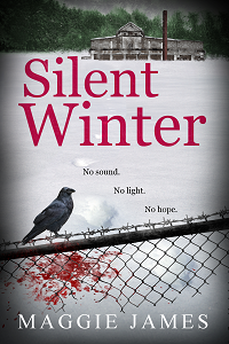 Just over four weeks until 'Silent Winter' is published - woo hoo! The novel is already available for pre-order in kindle format from Amazon, and I'm working on getting the paperback and audio versions ready. Meanwhile, I've had a short trailer made for the book, which you can watch here: Silent Winter trailer. Here's a taster of what the book is about: On an icy November night, Drew Blackmore is beaten unconscious, then abducted. He awakes to find himself in total darkness, naked and chained to the floor. Fed just enough to keep him alive, Drew is unable to identify his captor, or the reason for his incarceration. As reality fades, hallucinations take over. Can Drew escape his prison before madness claims him? Meanwhile Drew's wife, Holly, despairing of ever seeing him again, turns to his brother for comfort. As the worst winter in decades sweeps the UK, she learns of Drew's tragic past. Could his disappearance be connected with that of a prostitute years before? A story of how the mind responds to solitary confinement, 'Silent Winter' examines one man's desperate attempt to survive the unthinkable. You can pre-order the book here: Silent Winter pre-order. By pre-ordering, you lock in the introductory bargain price, which is 99c/99p for the kindle version. That's the price for the first week of publication, after which date the price will rise to $3.99/£2.99. The book will be delivered automatically to your kindle on December 5. Thank you! Watch the video trailer here!
 'You're so brave,' someone said to me recently. 'After all, you gave up financial security to follow your dreams.' For those of you who don't know my story, I used to be an accountant, in a secure and well-paid job. I ditched all that to pursue my ambition of becoming a novelist, a profession that many regard (wrongly, in my view) as being badly remunerated. That's a topic for another post! This time around I'd like to focus on the notion of comfortable ruts, and the insidious effect they have on people's lives. Years ago I read something that's always stayed with me: how sad it must be to die with regrets. This notion was reinforced as I watched my mother descend into dementia and my elderly father express regret about things he'd not achieved. The lure of the comfortable rut is a powerful one, though. Despite the lessons unfolding before my eyes, I remained an accountant. Why? Because it was the easy option. I earned a decent salary, didn't work overtime and had congenial colleagues and clients. I owned my home, was debt-free and indulged my love of travel frequently. A good lifestyle, most people would say, and yes, it was. I wasn't unhappy, not at all. Underneath, though, the itch to write novels nagged away at me. Had I hated my job, perhaps I'd have jumped ship earlier. I was in a comfortable rut, though, coupled with a strong need for financial security. Once you slip into a rut, it grows deeper, the danger being that it can engulf you, given time. Eventually, things turned sour at work. It wasn't bravery that led to my career as a novelist but the fire under my butt, sparking by the epiphany I had; the thought of staying put became unbearable. To my surprise, confronting my need for financial security proved far easier than I'd imagined. Once I ditched the regular salary, I found I managed fine without it, replacing the money from my writing income. I've been a full-time novelist for nearly five years now, and everything's going great! Why am I writing this post? To encourage anyone with unfulfilled dreams to pursue them. My friend who called me brave harbours some of her own, yet I'm not sure she'll ever achieve them. She could, though, if she chose. I suspect she's doing what many people do; they defer their lives. People tell themselves they'll travel the world, write a book, whatever, once they retire or the children leave home. Most don't, lulled into their comfortable ruts by the passing of time. None of us know how long we have on this planet, though. It makes sense to pursue dreams sooner rather than later, but for many, the thought becomes scarier the longer they fail to act. Once you make the decision, though, it's not that frightening! What's more, the rewards are incredible. I shudder to think about my life had I not given up accountancy. More than likely, I'd be living in the same house, working with the same clients, travelling whenever I got the chance but otherwise no further forward in becoming a novelist. Since jumping ship, I've written nine books, enjoyed an interim career as a dog walker, sold my house, moved to Northumbria, established a regular yoga and Pilates practice, brushed up my Spanish and travelled for several months in Canada, the USA, Asia and Latin America. I doubt I'd have done any of that had I remained in my rut, except for some of the travelling. I have some huge ambitions yet to accomplish, but after having taken a leap of faith once, doing so again doesn't seem daunting. Quite the opposite! Are you in a comfortable rut? Are there places you'd like to visit, books you'd like to write, relationships you'd like to forge? If so, I urge you to follow your dreams as soon as possible. If you want something badly enough, you'll find a way. Don't let fear rule your life, or be someone who dies with regrets. To me, that's incredibly sad. Warning! Contains spoilers regarding the plot of 'Nineteen Eighty-Four'. 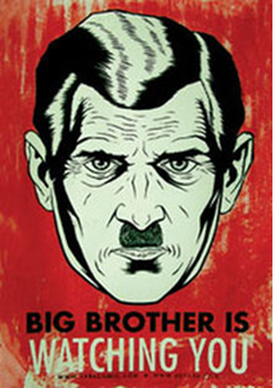 My fourth novel, 'The Second Captive', deals with the fascinating psychological phenomenon known as Stockholm syndrome. (More about what Stockholm syndrome entails later on.) Originally, I decided to blog about this as part of my 'Five' series, in which I examine five examples of anything fictional. No problem, I thought; I'll find the requisite number of novels about Stockholm syndrome and blog about them, and how they resemble or contrast with my own novel. Except it wasn't that easy. Mainstream fiction about Stockholm syndrome seems thin on the ground. Oh, I came up with lots of books professing to examine Stockholm syndrome. On closer examination, though, they all centred on BDSM themes, leaning towards the 'Fifty Shades of Grey' type of fiction. That's definitely NOT what 'The Second Captive' is about! So much for my original idea! Then I remembered one of my favourite novels, a book that made a huge impact on me when I first read it. A novel of such stature that I don't need four others for this blog post. One with a strong theme of Stockholm syndrome. That novel is 'Nineteen Eighty-Four' by George Orwell. What is Stockholm syndrome?  The former Kreditbanken The former Kreditbanken Before we examine 'Nineteen Eighty-Four' in more detail, let me explain what Stockholm syndrome is. For most of us, the concept is a weird one. How can someone profess to love the person who has captured them, held them against their will, even threatened them with death? The term originated after a bank robbery in Sweden in 1973, during which two robbers entered the Kreditbanken bank in Stockholm. A hostage situation ensued. For six days, the robbers held four people at gunpoint, locked in a bank vault, explosives strapped to their bodies, nooses around their necks. Bizarrely, upon their release, the hostages defended their captors; one set up a fund to cover their legal fees. Two of the women even became engaged to them. Thus the term "Stockholm syndrome" was coined. Other notable victims of Stockholm syndrome include Patty Hearst, who was kidnapped by the Symbionese Liberation Army but ended up joining their cause, and Natascha Kampusch, who wept when her abductor, Wolfgang Priklopil, committed suicide. So how does this strange psychological condition arise? Experts say at least three traits must be present: 1. A severely skewed power relationship between the individuals concerned. The captor decides what the hostage/prisoner can and cannot do. 2. The captor threatens the hostage/prisoner with physical harm or even death. 3. The hostage/prisoner holds a strong instinct for self-preservation. However, he believes he cannot escape and that survival is dependent upon the captor. Isolation from external points of contact enhances this viewpoint. Most of us have never been in such a desperate situation as the Kreditbanken hostages. If we endeavour to imagine what they endured, Stockholm syndrome seems less weird. If the only way to survive is to ally oneself with one's captor, is it not understandable that such feelings might deepen into something akin to love? Losing my fictional innocence... 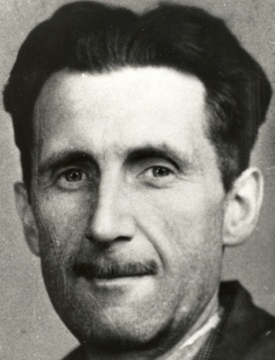 George Orwell, courtesy of Wikipedia George Orwell, courtesy of Wikipedia Let's turn now to 'Nineteen Eighty-Four.' I first read George Orwell's chilling novel in my teens, and since then I have been drawn back repeatedly to the book chosen by Time magazine as one of the best English-language novels published between 1923 and 2005. Orwell's story of life under a harsh totalitarian regime made a huge impression on me, partly because personal freedom is something I value greatly, but also because the novel's ending stripped away my fictional innocence. I remember approaching the second half wondering how Orwell was going to arrange the happy finale I was certain was coming. The one in which the Party is overthrown, democracy is restored, and Winston and Julia are free to carry on their relationship. As the number of words left for me to read grew ever fewer, I became increasingly perplexed. How, I asked myself, can all this be resolved when the book is running out of pages? Then I read the last chapter, a stunning conclusion to an outstanding novel, one which shattered every one of my naïve notions. A chilling dystopian nightmare of a world 'Nineteen Eighty-Four' is a perfect example of a dystopian novel. Set in a world where individualism is persecuted and labelled as 'thoughtcrime', it paints a bleak portrait of life under a harsh political system known as Ingsoc. The novel is based in the United Kingdom, now renamed 'Airstrip One', part of the superstate Oceania. Orwell describes a world of perpetual war, with Oceania always fighting one of the other two superstates, called Eurasia and Eastasia. Life is tough for the inhabitants of Airstrip One. The news is manipulated, citizens exist under constant surveillance, living conditions are squalid and there are shortages of basic necessities. Unless you're a member of the Inner Party, that is, the top 2% of the population who make up the ruling elite. For them, life is comfortable, prosperous, privileged. The rest of the country is split between the middle-class Outer Party members and the working-class 'proles', whom the Party largely ignores. At the very top of the system is Big Brother, around whom an immense personality cult has sprung up, even though it's unclear as to whether he actually exists. No happy ending for this novel... 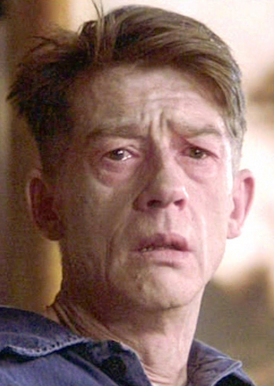 John Hurt as Winston Smith John Hurt as Winston Smith In this dystopian nightmare lives Winston Smith, an ageing Outer Party member, who works at the Ministry of Truth, rewriting recent history to reflect the current Party stance. Outwardly, Winston toes the Party line, but inwardly he hates the system and Big Brother, striving to make contact with The Brotherhood, a shadowy organisation dedicated to overthrowing the Party. Along the way he embarks on a passionate affair with a woman called Julia. They meet clandestinely in a squalid rented room, before being discovered and arrested. Winston undergoes a brutal ordeal of torture and interrogation, during which he encounters the chilling O'Brien, a member of the Inner Party and an interrogator at the Ministry of Love. O'Brien leads Winston's mind through the three stages of rehabilitation necessary for a good Party member: learning, understanding and acceptance. Then Winston is released, a free man. He slides into alcoholism, but also displays the symptoms of Stockholm syndrome. Alone, downing gin at the Chestnut Tree Cafe, he's pleased he's achieved a victory over himself, ending his previous "stubborn, self-willed exile" from the love of Big Brother, a love he now returns. An unequal balance of power 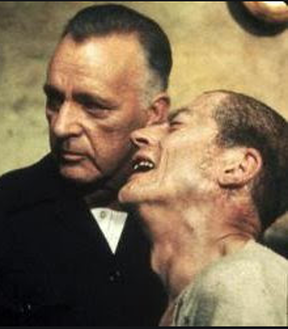 Winston and O'Brien Winston and O'Brien Let's look at how the relationship between Winston and O'Brien evinces the three key components of Stockholm syndrome. Firstly, the presence of a severely skewed power relationship. Tick number one. Winston Smith is a prisoner in the Ministry of Love, completely at O'Brien's mercy. Secondly, the threat of physical harm or death. O'Brien tortures Winston, including exposing him to his deepest, darkest fear - rats - in the dreaded Room 101. As for death, Winston's work at the Ministry of Truth has made him aware that Party opponents are routinely killed and written out of existence. Another tick here, then. Thirdly, Winston holds a strong instinct for self-preservation, evident in his love for Julia and his desire for a fairer world. Final tick. Despite the fact he's his torturer, O'Brien positions himself as both a father figure and a friend to Winston. Even in the interrogation scenes, an intimacy flourishes between the two men, with O'Brien showing an uncanny ability to know what Winston is thinking. Even as he inflicts pain on his victim, he professes to be doing it for Winston's own good, to save and purify him. The ground has been prepared, therefore, ready for the seeds of Stockholm syndrome to germinate. And that's exactly what happens. By the end of the novel, Winston's capitulation is complete. Evidenced by the incredible closing paragraph, as Winston stares at a poster of Big Brother: "He gazed up at the enormous face. Forty years it had taken him to learn what kind of smile was hidden beneath the dark moustache. O cruel, needless misunderstanding! O stubborn, self-willed exile from the loving breast! Two gin-scented tears trickled down the sides of his nose. But it was all right, everything was all right, the struggle was finished. He had won the victory over himself. He loved Big Brother. " Powerful stuff! Stockholm syndrome and my fourth novel 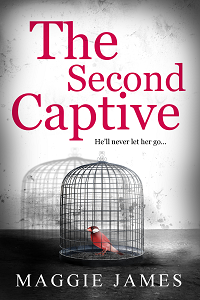 So how do I demonstrate Stockholm syndrome in 'The Second Captive'? Again, let's look at the three key components (without giving plot spoilers!) 1. There exists an unequal power relationship between my protagonist, the emotionally immature Beth Sutton, and Dominic Perdue, the man who abducts her and holds her captive by locking her in the basement of his house. 2. He mistreats her, demanding absolute compliance with his wishes. Whilst he's not a torturer like O'Brien, he does lead Beth to believe he's a killer. She fears her life may be in danger if she doesn't fall in with his wishes. 3. Beth is young, with a strong sense of self-preservation, demonstrated by her desperation to be reunited with her mother. Isolated as she is, though, the effects of Stockholm syndrome gradually creep up on her… Here's a taster: Beth Sutton is eighteen years old when Dominic Perdue abducts her. Held prisoner in a basement, she’s dependent upon him for food, clothes, her very existence. As the months pass, her hatred towards him changes to compassion. Beth never allows herself to forget, however, that her captor has killed another woman. She has evidence to prove it, as well as Dominic’s own admission of murder. Then Beth escapes… And discovers Dominic Perdue is not a man who lets go easily. Meanwhile, despite being reunited with her family, she spirals into self-destructive behaviour. Release from her prison isn’t enough, it seems. Can Beth also break free from the clutches of Stockholm syndrome? A study of emotional dependency, 'The Second Captive' examines how the mind makes dark choices under duress. Available from Amazon - click or tap the picture or this link: The Second Captive. (Guest post by Samuel Marquis) Readers should support authors of any stripe for only one reason: great writing 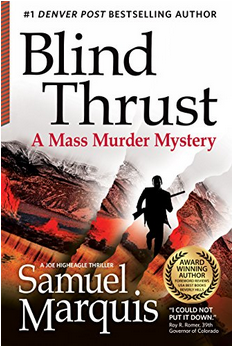 Years ago, when I was a literary neophyte and secretly harbored delusions of grandeur about the publishing industry, mega-author James Patterson gave me a blistering review for my Colorado-based earthquake thriller 'Blind Thrust'. The simple truth is I deserved it (he also gave me a glowing quote for my book 'The Coalition', but that’s another story). I fully deserved his ridicule for the first incarnation of 'Blind Thrust'—fully deserved to be flogged like an 18th century seaman in the Royal Navy—because my novel was, though I didn’t know it at the time, not up to industry standards in terms of the opening and overall plotting. It was not a bad novel; it just wasn’t sufficiently enticing to persuade someone to shell out $20 at Barnes and Noble or Tattered Cover. In other words, I didn’t give the creator of the Alec Cross Series and the biggest-selling author since the Precambrian Era sufficient justification to promote me or my writing because the book I was peddling was flawed, even though it was reasonably well written and seemed to me and my circle of reviewers at the time to be promising. In short, I had done the unspeakable thing that no storyteller—whether you are indie, traditional legacy, or a cave-painting Cro-Magnon at Lascaux—should ever do, and that is put out a story that isn’t quite ready for prime time. To my infinite chagrin, I had not earned the right for James Patterson to lend me his support for this particular novel. So what did I do? I went back and rewrote the book. Literally salvaged the submerged wreckage and rewrote the whole bloody thing. Then I had it professionally edited. Then I rewrote it again and edited it some more until I had revised it at least a dozen times. The editorial process landed me an agent, who proceeded to give me more editorial input, but at this point they were only minor tweaks because the book was highly polished. And now, recently, I received a completely different response to this reconstituted prose that had once been considered slush pile fodder. And from a highly credible critic I might add, someone who knows a thing or two about the written word, as he has perused hundreds of thousands of pages of non-fiction and fiction alike in his lengthy career in politics and as a Homo sapien sapien: “Blind Thrust kept me up until 1 a.m. two nights in a row. I could not put it down. An intriguing mystery that intertwined geology, fracking, and places in Colorado that I know well. Great fun.” —Roy R. Romer, 39th Governor of Colorado 73 eager fans on four continents... The quote, I might also add, was unsolicited. So, by a simple twist of fate, the three-term governor of the Centennial State and one-time chairman/co-chairman of the Democratic Governors Association, Leadership Council, and National Committee, as well as the Clinton-Gore '96 campaign, got hold of an Advance Reading Copy of 'Blind Thrust', proceeded to read it cover to cover, and decided to give me a rave review (Okay, full disclosure, he snagged a copy of the ARC from his son, my friend Tim, that had been laying there on a table in Vail, but please note that the honorable Gov. Romer doesn’t know me from Donald Trump). What’s important about the episode is that a book that was once justifiably pilloried in its earliest incarnation had miraculously become so enthralling that a highly discriminating reader who presumably likes to go to bed early could not put it down and was forced to stay up late two nights in a row to finish the book. That same discriminating reader then proceeded to send me an unsolicited book blurb declaring before the entire world (or at least the 73 people from four continents, including my 94-year old Aunt Margaret, who will actually read my book): “I could not put it down.” The quote has made its way onto the front and back covers of Blind Thrust, which has now been released for the enjoyment of my 73 eager fans. There is only one reason that any of this happened: the novel went from subpar, or just not good enough for publication, to something closer to superb, or at least good enough that it was deemed 'unputdownable' by an unbiased reviewer whose opinion actually matters. Authors should hold readers hostage with their writing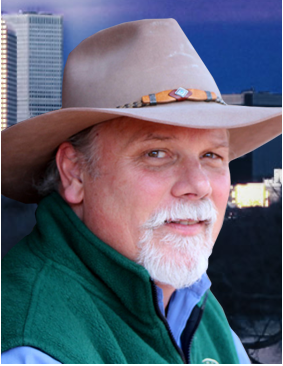 Author Samuel Marquis Author Samuel Marquis So why should readers support indie and traditional legacy authors? For only one reason: good solid writing. Craftsmanship. Actual hard work, sacrifice, and talent coming together into an amalgam of significance. Having gone through this experience, I realize now what the ultimate goal of a thriller writer should be: Make people stay up late at night against their will and not want to put the book down. Hold them hostage with your writing. Because they will only go against their will if the suspense is so gripping, the plot and characters so riveting and unpredictable that the story literally casts a temporary spell over them. Because the book you’ve penned—even if it’s not 'Moby Dick' or 'David Copperfield'—is quite good in its own unique way. And that is the only reason why readers should support authors, be they indie or traditional legacy authors or those fur-clad, cave-dwelling raconteurs at Lascaux. Because a work is actually really damned good. Unfortunately, it is hard to make something hard to put down and make every page, indeed every line or paragraph, fume with tension. I know I have failed miserably in the past and I will no doubt fail again in the future. But ultimately quality and constant tension should always be the goal in a suspense novel. Nothing else should matter. We all have to write better and put forward the best material we can. Material that has been thoroughly vetted and edited and re-edited until we are bleary-eyed and brain-dead and so utterly preoccupied with making the thing good that our friends and significant others are convinced that we’ve taken a lover on the side. Ultimately, readers don’t care if you received your Creative Writing degree from Oxford or Yale, are a mega-best-seller, or are close friends with J.K Rowling or Lee Child. They just want a great story. Over and over again, every time out. Readers will always support great writing. And they will stay up late at night to read it. But only if we writers put in the hard work and truly do our jobs. I had to learn that lesson the hard way. More about Samuel MarquisSamuel Marquis works by day as Vice-President – hydrogeology for an environmental consulting firm in Boulder, CO, and by night as writer of historical and modern suspense novels. He is the author of 'The Devil's Brigade, 'Blind Thrust' and many other novels, has published over 25 articles in peer-reviewed scientific journals/books, and has served as an expert witness on multimillion dollar environmental cases.
He can be reached on his website at www.samuelmarquisbooks.com or by email at [email protected]. Fiction writing as a catharsis? 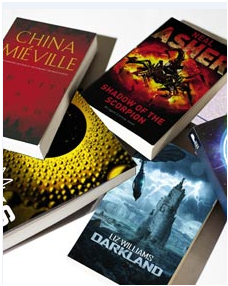 Courtesy of The Guardian Courtesy of The Guardian Do novelists use their fiction as a catharsis for their personal issues? Since I began my writing journey, I’ve realised that many people believe they do. ‘I’m keen to read your books,’ someone once told me. ‘I’ll find out more about what makes you tick.’ I’m paraphrasing, but that was the essence of her words. ‘No, you won’t,’ was my inner response. Her comment got me thinking, however, so I mentioned the conversation to a fellow novelist. ‘A friend of mine believes fiction writers explore their issues via their writing,’ I told her. ‘I think that’s a huge overgeneralisation. I don’t.’ The reply was immediate, its tone dismissive. ‘Of course you do. Don’t all writers?’ I was flabbergasted. It’s a view I strongly contest. Its proponent is, I believe, falsely extrapolating from her own circumstances. For her, writing is indeed a catharsis; she uses her work as a vehicle to explore her childhood issues. She’s not alone. Stephen King has said that he writes about what scares him as a way to exorcise his own demons, using fiction as an alternative to therapy. Fair enough, but for me, it seems a flawed assumption to say that all writers are the same. We're not all tortured souls in need of therapy 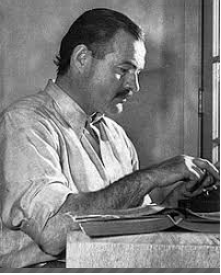 Courtesy of Wikipedia Courtesy of Wikipedia The notion that authors use their novels as a catharsis for exploring their psyche seems a common one, though. Perhaps it comes back to our tendency to embrace one-size-fits-all stereotypes as a convenient, but lazy, way of interpreting the world. Once an image gets into the popular imagination, it sticks. Fiction writers? Aren't they all tortured souls who fuel their literary outpourings during the small hours via copious amounts of alcohol, in between lamenting the perils of writer’s block? Take Ernest Hemingway, right? Case closed. The truth is, novelists are a diverse bunch. Sure, some will seek to explore personal issues via their fiction. Others won’t. There’s no cookie-cutter profile that fits all. I can best give my own position by saying that I’m a private person; the notion of exploring my psyche publicly via my novels fills me with horror. Writing is not, I repeat, not a catharsis for me. None of the terrible issues I inflict upon my long-suffering characters have ever happened in my life. I’ve never been kidnapped, violently raped, endured a psychotic sibling or absent parents. Phew, plenty of things there for which to be grateful! My motivation for writing fiction is simple. I love being a novelist. OK, so my books fall into the psychological suspense category. That in itself says nothing about me. Yes, I’m fascinated by the workings of the human mind, but there aren’t many topics in which I’m not interested. Maybe some people will say 'Methinks the lady doth protest too much', but if that's you, then so be it. I can't change how you think, and besides, I'd rather be writing. My seventh novel beckons... Novelist Iain Rob Wright's take on the subject 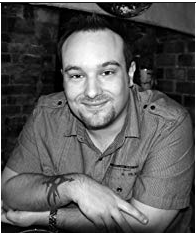 Iain Rob Wright Iain Rob Wright Other fiction writers agree with me. The British horror/thriller novelist Iain Rob Wright said on his blog: ‘Just because someone has read one of my books, does not mean they know a single thing about me. I write characters with views of their own. If one of my protagonists collects stamps, that does not mean that I do. The truth is that I would never make my own views entirely obvious through my work, because then I am not creating fiction, I am writing propaganda.’ My point exactly! So to readers of my books, of Iain’s books, to fiction readers in general, I’d say this. Read our novels because you enjoy them, not to discover more about us. Don’t think you can judge an author by his/her books. You can’t presume to know a novelist's motivation for writing, unless they’ve publicly stated it. What do you think? Let me know! I’d be interested to hear from other fiction writers. Is your work cathartic for you? If so, to what extent? Readers, do you make assumptions about an author based on what they write? Leave a comment and let me know!
|
Categories
All
Subscribe to my blog!
Via Goodreads
|
Join my Special Readers' group and receive a free copy of 'Blackwater Lake'!
|
Privacy policy Website terms and conditions of use
Copyright Maggie James 2018 - current date. All rights reserved.
Copyright Maggie James 2018 - current date. All rights reserved.
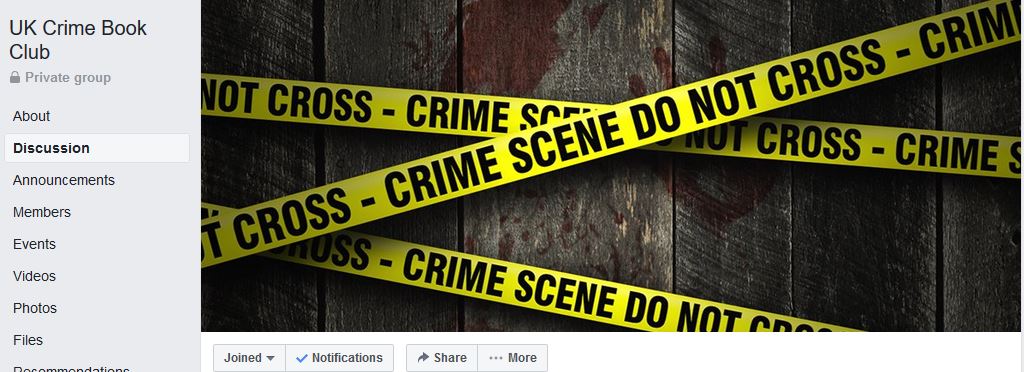

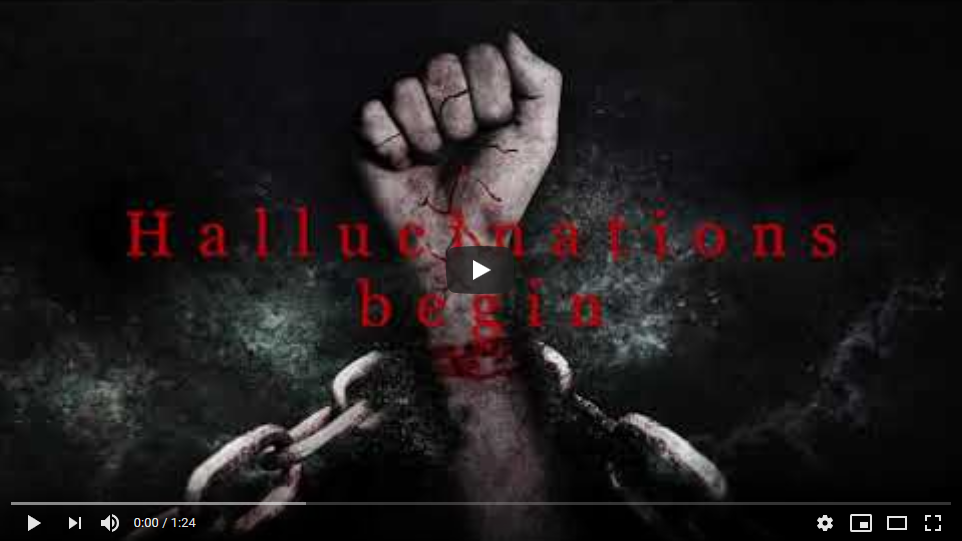
 RSS Feed
RSS Feed
